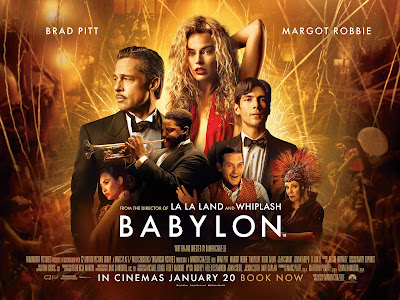Babylon
Writer
& Director – Damien Chazelle
2022,
US
Stars
– Brad Pitt, Margot Robbie, Diego Calva, Jean Smart
A
“Look At Me!” film from the very start, but less obnoxious than Luhrmann and
not quite as Music Video as Snyder. Bookended by a deliberate showiness at the
beginning and a delusion of meaning at the end, there’s still a lot to like
here. It would seem that those involved think of ‘Babylon’ as an
important statement on cinema and the era it evokes – indeed, the title doesn’t
suggest modesty – but the drama and flashiness aren’t original, just
entertaining. It’s all the tropes in their best dress. Brad Pitt is initially
in shit-eating-grin mode and Margot Robbie is one of those intolerable
“troubled free spirit” whirlwind girls, but when the film settles and stops only showing off and the actors add
nuance, they get to do sterling work. After all, these are great actors.
Robbie’s bar-top dancing debut and her first foray into the talkies are great
set pieces. But it’s Diego Calva that does the work that grounds the drama; you
can see and care for the development of character in him most of all, from
wide-eyed set flunky to someone who can manipulate even himself and his genuine
niceness when his newfound career demands it.
There’s
a hint of what ‘Blonde’ was on about, exploiting and devouring its own;
impressive old-style hundreds of extras in the background; a horror diversion
into a dungeon of freaks that proves again that the film is just running on
tropes, however amusingly. And there is a Tobey Maguire in a maximum scary cameo.
Even Tarantino’s ‘Once Upon a time in Hollywood’ touches base with the
reality of behind-the-scenes more credibly. The grit and destruction here is
the Hollywood Dream kind.

So
we end up with a montage namechecking films that broke technical moulds. It’s
both an audacious and laughable montage, proclaiming a film student level of
insight and emotional resonance. You may snort, “Really?” Critic Robbie Collins
gives a most generous reading that Manny’s tears and smile are those of defeat
and acceptance at a system that chews’em up and spits’em out; but that’s
perhaps allowing it more than surface depth (it certainly didn’t strike me that
way). For me, the most poignant scene, the one that made me think I was being
told something real, is the moment where the black performer Sidney (Jovan
Adepo) is persuaded to apply black face to be as dark as his band mates for the
camera.
Otherwise,
I was left wondering what I was meant to feel nostalgia for? A party that is
half orgy? Reckless and dangerous film sets with no safety rules and rampant
exploitation? Characters that are lushes and addicts and privileged bores at
best and moral vacuums at worst? Decadence as the ultimate goal? It’s a
charmless world, however hedonism is celebrated. Despite the many great scenes
and moments, despite the cast doing solid work, despite always being entertaining
and lush, the film’s nostalgia for a romanticised film era – one the Chazelle
is too young to have experienced – ultimately seems muddled and false. It’s no
way as genuinely troubling as his ‘Whiplash’ existentialism, asking, “What
does it take to be an artist?”
Entertaining but unconvincing.






